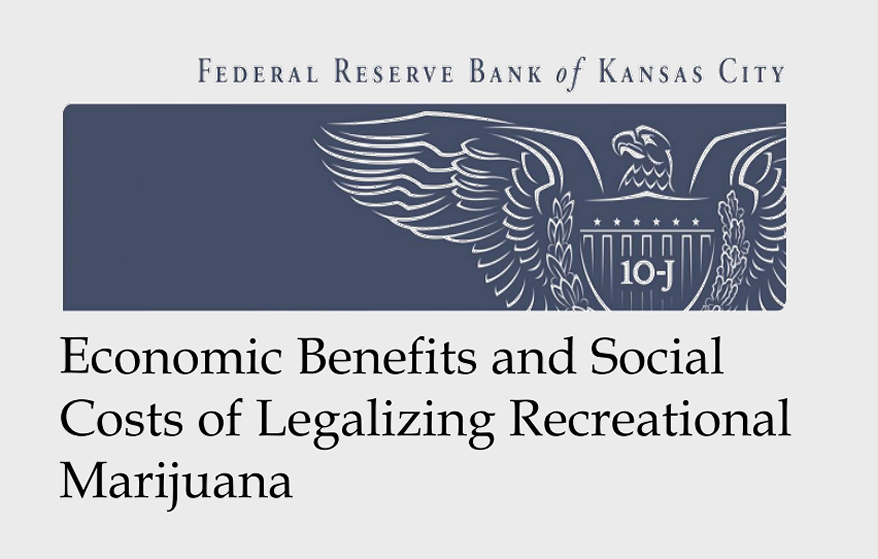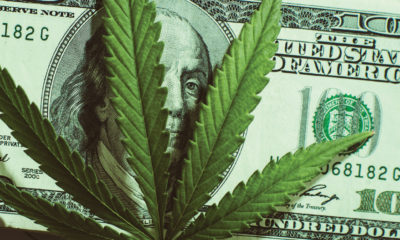
The ongoing national conversation about legalizing recreational marijuana in the United States has gained fresh momentum with a recent report by the Federal Reserve Bank of Kansas City.
The study delves deep into the potential economic benefits and social costs, offering interesting new insights into an issue that has captivated the nation for years.
Global Cannabis Times brings you a summarized overview of this new data, shedding light on the complexities of marijuana legalization and its far-reaching implications for both the economy and society.
Seeing the Whole Picture
Advertisement
At the core of the report, titled “Economic Benefits and Social Costs of Legalizing Recreational Marijuana,” lies the bank’s comprehensive analysis of marijuana legalization. This analysis differentiates itself from previous research by delving into a wide spectrum of factors. These encompass shifts in marijuana usage, substance abuse disorders, labor force participation, crime rates, homelessness, traffic accidents, drug overdoses, hospitalizations, GDP, income per capita, tax revenue, business establishment rates, job creation, housing prices, and population growth.
To truly grasp the impacts of legalization, the study focuses on states that have embraced recreational use, spanning the years from 2000 to 2020. Using a difference-in-differences strategy that accounts for variations in legalization dates and state-specific dynamics, the report uncovers several notable findings.
Marijuana Use on the Rise: Consequences Unveiled
The study highlights a significant increase in self-reported marijuana usage, estimated at approximately 28 percent. It also notes a 17 percent increase in substance use disorders and a 13 percent rise in arrests. Chronic homelessness also experienced an uptick of 35 percent, although this increase didn’t reach statistical significance. Interestingly, the surge in arrests did not lead to a significant increase in overall crime rates, potentially due to increased funding for public safety possibly thanks to marijuana tax revenue.
Economic Growth: Income and Housing Boom
On the economic front, the study reveals that states embracing recreational marijuana experienced an average increase in state income per capita of about 3 percent. This boost was primarily driven by heightened proprietors’ income. Additionally, housing prices surged by 6 percent, and population growth increased by 2 percent.
Advertisement
Balancing Act: Weighing Costs and Benefits
However, the report underscores a crucial disparity: while the economic benefits of recreational marijuana legalization benefit a wide swath of the population, the costs seem to be more concentrated. This highlights the importance of policymakers exercising caution and taking potential social costs into account when evaluating the implications of legalization.
Addressing Social Costs: Potential Solutions
Although the report refrains from conducting a formal benefit-cost analysis of recreational legalization, it suggests a potential framework for allocating funding to social programs designed to mitigate the associated costs. For example, the study’s reported 3 percent increase in income per capita post-legalization could potentially offset the estimated benefits, amounting to approximately $1,400 per capita.
Timing Matters: The “First-Mover Advantage”
One particularly interesting observation from the report is that states that legalized marijuana earlier appeared to reap larger economic benefits. This suggests a “first-mover advantage.” In contrast, states that legalized marijuana later in the study period experienced smaller estimated benefits, possibly due to the novelty wearing off or a reduced perceived amenity.
Advertisement
Looking Forward: Informed Decision-Making
In a nutshell, the report takes a deep dive into the economic benefits and social costs of legalizing recreational marijuana, shedding light on both sides of the coin. While it showcases the potential economic gains, it also underscores the need to weigh social costs carefully in our evolving policy landscape. Looking ahead, it’s just one more resource for policymakers and stakeholders seeking to grasp the potential impacts on both our economy and society. And it’s a reminder that as the ongoing debate over marijuana legalization unfolds, addressing these social costs and making informed decisions will be key.
A PDF of Economic Benefits and Social Costs of Legalizing Recreational Marijuana can be downloaded here.

 Cover Features11 months ago
Cover Features11 months ago
 Cover Features11 months ago
Cover Features11 months ago
 Legal9 months ago
Legal9 months ago
 Branding10 months ago
Branding10 months ago
 Products9 months ago
Products9 months ago
 Branding12 months ago
Branding12 months ago
 Business12 months ago
Business12 months ago
 Podcasts11 months ago
Podcasts11 months ago















